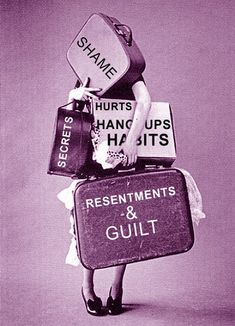
“Our parents, our children, our spouses, and our friends will continue to press every button we have, until we realize what it is that we don’t want to know about ourselves, yet. They will point us to our freedom every time.” – Byron Katie
I’m quite sure most of us understand the term baggage as it relates to relationships. After my divorce, I experienced several dating sites, and often I would see these words “I’m looking for someone without baggage” P L E A S E !! What planet were they from–because on this one, relationship baggage is real–but how best deal with it other than allowing it to define who we are?
You’ve probably rarely heard of a child having baggage–most likely because most of them don’t at a young age (thank Heavens). “Baggage” might include negative emotions, defining events, and limiting beliefs that we have collected throughout our lives and then tote around.
Actually, it’s really quite simple. We can either choose to heal, release and return these bags to where they came from, or feel burdened and defined by them for the rest of our lives. Realistically, how healthy can we be in our current relationship(s) if we’re carrying all this brouhaha?
Our parents are usually the first example of what relationship(s) look like. Since they surround us in our formative years, there’s a strong tendency to model what they did or said.
And at the most extreme level, patterns of abuse–verbal, physical and emotional–tend to be repeated again and again–from generation to generation–however, realistically there are no perfect parents out there–so we are all most likely carrying around a load–baggage that is. (simile)
Even if there wasn’t abuse, children pick up the most subtle patterns of relating and carrying them into the future. Does the father go silent and close down at the end of an argument? Does the mother nag her husband to get things done? What does the child learn from all of this?
We can use EFT (Emotional Freedom Technique) or The Emotion Code (discusses in my two previous articles) to break or clear these generational patterns and avoid bringing this baggage of trapped emotions into our new relationships and continuing to pass them on to our children.
It has been proven that trapped emotions can contribute to illness and ultimately prevent us from living the life we could be living–so once they have been cleared–how can we prevent them in the future? These tips were taken from The Tiny Buddha site after a potential negative emotion is discovered:
1. Grab a pen and notebook and write an honest list of the thoughts, beliefs, and behaviors that weigh you down. Don’t judge what comes up, just take note.
2. Reflect on each item and identify the source of the thought/belief. Travel back in time and see where you picked up these items of baggage. Do you dread holidays because your parents drank too much? Acknowledge the painful memories but don’t wallow in them.
3. Find at least one positive in each hurtful experience/situation. Look for the silver lining in your cloud. For example, “my father’s criticism made me aware of the power of words and taught me the importance of speaking with kindness”. Looking for the good in the past helps you reclaim your power. You are no longer a victim–YES!
4. Create affirmations to foster change and counteract negative thoughts. Take the positives from step three and turn them into affirmations or statements of intent, i.e.: “I will speak with love” or “I will treat people with kindness.” This puts the emphasis on positive future behavior and helps free us from the past.
5. Practice patience and mindfulness. It takes time to change habits, especially when they are rooted in deep hurts or fears and get tapping or clearing.
This is how we’re meant to live–we’re meant to live vibrant, healthy lives, filled with love and joy. Of all the emotions, love is the post pure and has the higher vibration. Let’s be determined to vibrate from a higher level, Warriors.
